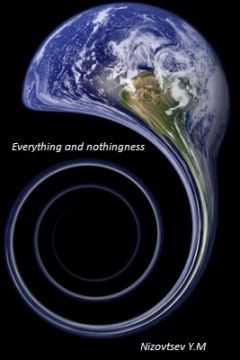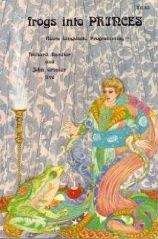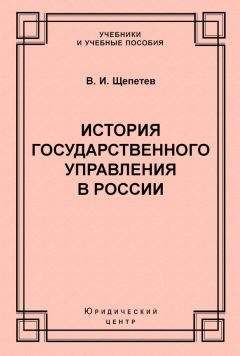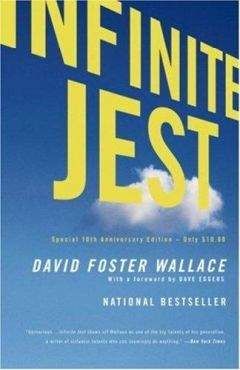Юрий Низовцев - Everything and nothingness
На электронном книжном портале my-library.info можно читать бесплатно книги онлайн без регистрации, в том числе Юрий Низовцев - Everything and nothingness. Жанр: Религия издательство -, год 2004. В онлайн доступе вы получите полную версию книги с кратким содержанием для ознакомления, сможете читать аннотацию к книге (предисловие), увидеть рецензии тех, кто произведение уже прочитал и их экспертное мнение о прочитанном.
Кроме того, в библиотеке онлайн my-library.info вы найдете много новинок, которые заслуживают вашего внимания.

Юрий Низовцев - Everything and nothingness краткое содержание
Everything and nothingness читать онлайн бесплатно
Ознакомительная версия.
Numerous definitions of concept of truth affects only its separate sides, but doesn't penetrate into its sense. inasmuch classical definition of truth, in which the main criterion of truth is identity of thinking and beingness, rests against the fuzzy concepts "thinking" and "beingness" which yet should be brought into accord somehow.
Nevertheless, to truth anyway only consciousness can come, "having looked" at itself, at the surrounding and, further selecting subjects, to try to bring into accord with own intentions these subjects, most likely, changing them in own highest expression, than adapting of yourself under them.
Therefore truth in the course of cognition is always specific and depends on the level of knowledge and ability to put them, i.e. it is checked by practice, as a rule, and only limited is checked by favor so how seeming pragmatically superfluous and even unwanted for this moment of knowledge and skills can "flip" the world in the sequel, whereas the aspiration to benefit, to satisfaction of the desires, determined only by conviction (belief) is downfall of the person up to level of "consumption" only the useful that is similar to the animal adaptation to the environment instead of its conversion, and it leads eventually to degradation of the person. So that Pierce too narrows concept of truth: "A true proposition is a proposition belief in which would never lead to such disappointment so long as the proposition is not understood otherwise than it was intended” [6, p.242-257].
Another definition of "the father" of pragmatism Peirce pertaining to truth: “Consider what effects that might conceivably have practical bearings you conceive the object of your conception to have. Then your conception of those effects is the WHOLE of your conception of the object” [7, p. 331-346] proposes to take into account all "conceivably practical”.
Here, too, it appears a insufficiency of two types: the practical today may seem by one circle of things, tomorrow – another, that introduces uncertainty in the concept of the object, which also can be seen from an unexpected quarter – so appear inventions; besides, the practical is nevertheless mostly the useful, the utilitarian, excluding imagination, flight of thought, "mad" ideas, which are capable to change radically our life, and really changed it, especially for the last decades.
Truth in accordance with the growth of knowledge and practical application changes its appearance so how human consciousness goes from essences of one level to essences which are deeper. And in this sense truth corresponds to essences revealed.
Here it is possible to agree with Lenin V. I., which declared: “For the materialist the “success” of human practice proves the correspondence between our ideas and the objective nature of the things we perceive” [1, chapter 1.2]; with the amendment that "the objective nature of things," initially no, because things, which are independent of consciousness, are not exist – all of them, or rather their copies are formed by consciousness in accordance with its form-building capabilities and these copies are "given" to a person for his life and development, in the course of which evolves and changes his consciousness itself, which acquires a "transient" independence in each life of individual consciousness. Therefore, only for a individual consciousness in the person, which is "clipped" one-sided from the single consciousness, all things become independent of him during his lifetime, acquiring still and motion, change precisely in order that he could overcome the resistance of the medium out of things and other people with their own individual consciousnesses competing with him and could "compel" things to "obey" to him.
Except of the practice the stability can be criterion of truth. The stability is expressed in a number of logical deductions, virtually no checking, but based on known laws.
One cannot deny touch to truth of and by means of intuition, i.e. as the process of finding truth without the intermediate steps from the first principle to whom may be just aught appearing, inasmuch human consciousness cannot penetrate into "space" from where is taken all, that appear.
Hobbes and Berkeley till Husserl have understood this situation with the relation of sensations (consciousness) and things.
Hobbes detaches sensations with all their derivatives from objects, generating in us sensations: “And though at some certain distance, the real and very object seem invested with the fancy it begets in us; yet still the object is one thing, the image or fancy is another” [8, p. 1-2].
Separation by Thomas Hobbes sensations and objects, in essence, was the basis for the ideas of Berkeley, consisting in the fact that without existence of senses and reason existence of everything else is problematic, because nothing and no one perceive it.
Berkeley believes existence of things only due to their perception by the human mind, or his soul, inasmuch there is no evidence of separate existence of things outside human sensations: “XXIII. But say you, surely there is nothing easier than to imagine Trees, for instance, in a Park, or Books existing in a Closet, and no Body by to perceive them, I answer, you may so, there is no difficulty in it: But what is all this, I beseech you, more than framing in your Mind certain ideas which you call Books and Trees, and the same time omitting to frame the Idea of any one that may perceive them? But do not you your self perceive or think of them all the while? This therefore is nothing to the purpose: It only shews you have the Power of imagining or forming Ideas in your Mind; but it doth not shew that you can conceive it possible, the Objects of your Thought may exist without the Mind: To make out this, it is necessary that you conceive them exist unconceived or unthought of, which is a manifest Repugnancy” [9, p. 18].
To the extreme, like Berkeley, Husserl does not come, but he joins to Hobbes and Berkeley in the thought, that meditation of the primary source, or the appearing, is the true source of knowing: “No conceivable theory can make us err with respect to the principle of all principles: that every originary presentive intuition is a legitimizing source of cognition, that everything originarily (so to speak, in its “personal” actuality) offered to us in “intuition” is to be accepted as what it is presented as being but also only within the limits in which it is presented there. We see indeed that each theory can only again draw its truth itself from originary data. Every statement which does no more than confer expression on such data by simple explication and by means of significations precisely conforming to them is, as we said at the beginning of this chapter actually an absolute beginning called upon to serve as a foundation a principium in the genuine sense of the word” [10, p. 44].
Along with that Husserl, in fact, if truth is adequate to what we call essence, considers that truth is unattainable in full, i.e. as the absolute: “The specific character of certain categories essences is such that essences belonging to them can be given only “onesidedly”, in a sequence “many-sidedly”, yet never “all– sidedly”” [10, p. 8].
Hume treats truth as compliance of thinking to sensations of the person: “We perceive only properties of those forces which are available to senses" [11, p. 22]; “They are the successive perceptions only, that constitute the mind; nor have we the most distant notion of in place, where these scenes are represented, or of the materials, of which it is composed” [11, p. 253].
In its considerations Hume accurately catches that circumstance that primordial source of Whole for human consciousness are namely sensations. In this respect he is quite right, because it is through the senses information comes into control centers of consciousness of the person. Hume also is right in his doubt about existence and qualities of the things which are beyond the senses. Here he is certainly consistent in their views and findings, and differs from other thinkers in that does not take the responsibility to determine aught unknown to him, to speculate on the basis which is impenetrable for him.
However, Hume, like most of thinkers, concentrates the attention not on consciousness, and on the person, and this circumstance, naturally, leads him to not quite adequate conclusions: "… on what base we should think that the same forces will be always combined with the same felt qualities. Therefore, the principal in life is not the mind, but a habit. Only it forces mind in all cases to assume that the future corresponds to the past. How easy did not seem this step, mind never for all eternity would not be able to make it" [11, p. 22]
One can hardly argue with Hume that experience, the habit generated on its basis that is an important factor in human life, the more that Hume rightly pointed out existence of many unknown to us Forces that involves for the person a support preferably on known and clear to him.
Nevertheless, here Hume pulls together the highest consciousness inherent in the person, with the lowest consciousness, belonging to the living beings without self-consciousness. The living beings without self-consciousness really only adapts to the environment by trial and error, accumulating over many generations of genetic memory that allows them to coexist satisfactorily with the environment and to struggle with competitors on the basis of accumulated experiences and genetic memory. But all this doesn't allow living beings without self-consciousness to raise above the environment – in a result, essential change of the environment leads to death of the whole types.
In contrast to the lower consciousness of the living beings without self-consciousness, the higher consciousness of the person is characterized primarily not by mind, which is inherent in all living things in one form or another as centers that process information, incoming from sensations, but by awareness of yourself itself, which implies not just the adoption of the information from sensations and more or less adequate reaction to it, but and the subsequent conscious change of everything that manifests before him and in him.
For this purpose the consciousness in the person has a set of means: imagination, extensive databases, human interaction, intellection of all its forms, purposeful skilled verification of the arriving information, formulation and consolidation of regularities, deduced on the basis of experience and logical processing of information, aspirations for the new, the unknown, producing upheavals in life on the basis of inventions and utilization of fundamental discoveries, etc.
Therefore the habit characteristic only for the layman, who muffles aspirations of own consciousness to the unknown, who prefers to live within already the tested, but not for not strangled consciousness, who always seeks to overcome any circumstances at any cost.
Following Berkeley, Avenarius, denying existence independent of human consciousness reality, believes in this regard that truth is not compliance of consciousness to objective reality, but it is a result of coincidence of the perception of the majority, consistency of data, aspiration to integrity of system of data or as the coherence of sensations: “Here we only noted aspiration for a higher unity, because in it lurks the aspiration to think in the concept of a coherent whole. We could note this fact and on dualism, so as after all its division of the world into two opposites testifies to the thinking, which is addressed to integer; but we thought that the aspiration to finite, higher unity better expresses the need thinking of the totality of things, as understood" [3, §39]; “The final result of our analysis concurs—although not absolutely (durchgehend) in the measure of the various points of view—with that reached by other investigators…” [12, p. 120].
Hegel also joins the aforementioned thinkers in relation to the absolute truth. If we recall the definition of the absolute, which has gave Hegel, namely: “The absolute is the unity of subjective and objective … whereas in fact subjective and objective after all not only are identical but also different” [13, p. 116], then the absolute neither in the current life, nor in thinking can't be.
In terms of the interaction of consciousness and things, identified by consciousness, process of deepening of consciousness in the thing depends on the level of consciousness, which can understand the essence of thing only in accordance with it, moving ahead, for example, from the general concepts "heat" and "cold" to laws of molecular motion in different environments.
Therefore it is inadequate to consider that each step in the knowledge is the absolute truth, moreover it is possible to go deep into the thing infinitely not only because nobody knows its depth but also because consciousness itself changes "jumping" from one level of development on another where things appear before him in other appearance and obey to other regularities.
Perhaps that is why the oldest religion on Earth – Hinduism – stated: truth cannot be expressed because of its diversity.
And contemplative in its essence Buddhism, by contrast, thought that truth is revealed in front of each of your gaze.
It was shown above how difficult to object to both.
Be that as it may, but practical advance of mankind both in technical, and in moral the relations show that coincidence of aspirations of people with cognizable by them to the main natural and public regularities in refraction them to the solution of practical tasks lead actions of people to real achievements. Means, truth nevertheless exists!?
But really truth has only relative, banal or pragmatic character? Perhaps, there is aught beyond the current reality which nevertheless can be understood intuitively and added to the few fundamental truths.
It seems that to approach to decision of this problem is only possible due to clarify the correlation of such categories as beingness, consciousness, information.
1.2. The active and the passive in the unity and a division
Beingness in the usual formulation is existence of things. However in our opinion, this understanding is not enough, because to explain this existence as a separate is impossible.
Therefore God arises inevitably for some – divine source and the prime propulsor of these things (the real).
The opposite camp as opposed to this view puts forward a hypothesis of self-development of matter.
Both aren't represented by satisfactory interpretations of existence of the real.
As for God, this omnipotent, live, external and infinite being is so contradictory and fantastic, that it is only possible to believe in him from hopelessness, that and happening. More in details on these and other properties of God we will stop below.
If to present matter in the form of some formation which itself moves and always was in motion, and in this motion it forms else, including consciousness, then, firstly, if to prove that motion is visibility, or rather, motion is secondarily, appearing only owing to technical transformation of process of updating of copies of things in consciousness of living beings in motion, then self-development of a matter does not exist. Secondly, it has long been proven, that the genome of any living being is so complex that a self-assembly, self-development is impossible for it. However, the living beings exist and there are even the living beings, conscious of themselves, i.e. the people themselves. Thirdly, inasmuch it is recognized that self-development is the ongoing progressive process, then it must have initial and final conditions.
Ознакомительная версия.
Похожие книги на "Everything and nothingness", Юрий Низовцев
Юрий Низовцев читать все книги автора по порядку
Юрий Низовцев - все книги автора в одном месте читать по порядку полные версии на сайте онлайн библиотеки My-Library.Info.




